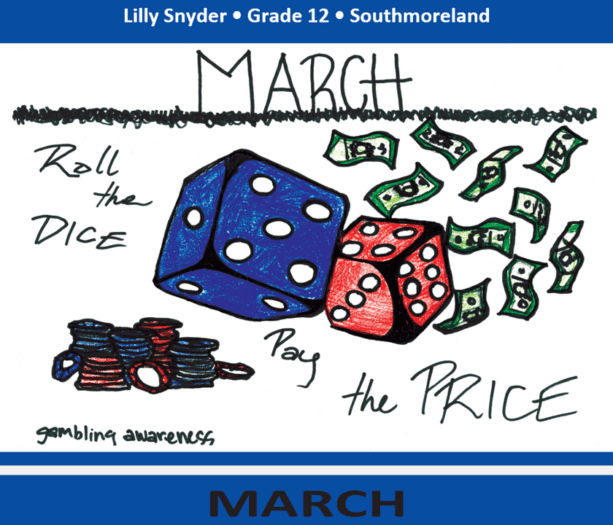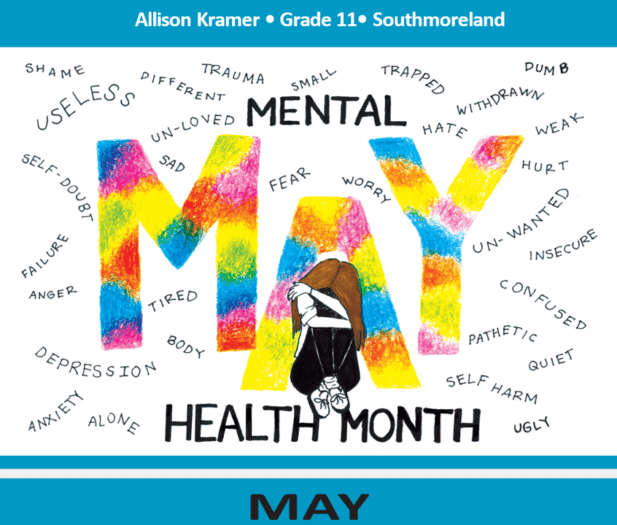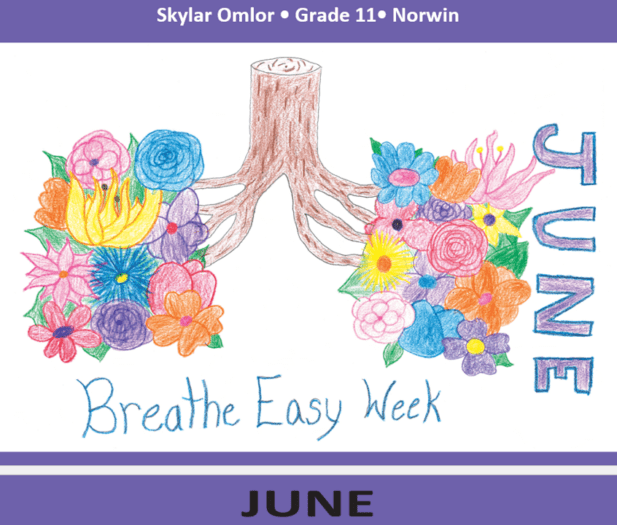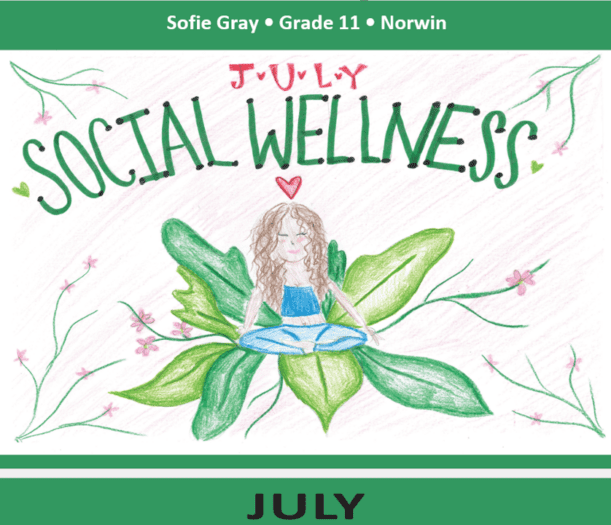
The Front Cover of the 2025 CSAY Calendar winner is from Norwin High School and will receive a $100 Gift Card:
Giovanna Fuchel

Thank you to all of the Westmoreland County schools that participated in our 2025 CSAY Calendar Contest! The CSAY calendars will be distributed across Westmoreland County and help to bring awareness to the various Prevention and Awareness Days/Months throughout the year. Below are the winners from across Westmoreland County.

The Front Cover of the 2025 CSAY Calendar winner is from Norwin High School and will receive a $100 Gift Card:
Giovanna Fuchel

The Back Cover of the 2025 CSAY Calendar winner is from Valley Area Jr/Sr High School and will receive a $100 Gift Card:
Reilly McAdams

The January winner of the 2025 CSAY Calendar winner is from Mount Pleasant Area Jr/Sr High School and will receive a $50 Gift Card:
Madison Poole
The February winner of the 2025 CSAY Calendar winner is from Valley Jr./Sr. High School and will receive a $50 Gift Card:
Ming Yankel

The March winner of the 2025 CSAY Calendar winner is from Southmoreland High School and will receive a $50 Gift Card:
Lilly Snyder

The April winner of the 2025 CSAY Calendar winner is from Southmoreland High School and will receive a $50 Gift Card:
Jenna Eutsey

The May winner of the 2025 CSAY Calendar winner is from Southmoreland High School and will receive a $50 Gift Card:
Allison Kramer

The June winner of the 2025 CSAY Calendar winner is from Norwin High School and will receive a $50 Gift Card:
Skylar Omlor
The July winner of the 2025 CSAY Calendar winner is from Norwin High School and will receive a $50 Gift Card:
Sofie Gray

The August winner of the 2025 CSAY Calendar winner is from Mount Pleasant Jr/Sr High School and will receive a $50 Gift Card:
Maya Shodd

The September winner of the 2025 CSAY Calendar winner is from Norwin High School and will receive a $50 Gift Card:
Riley Mulroy

The October winner of the 2025 CSAY Calendar winner is from Greensburg Central Catholic High School and will receive a $50 Gift Card:
Tristan Tiedeman

The November winner of the 2025 CSAY Calendar winner is from Norwin High School and will receive a $50 Gift Card:
Elizabeth Cupp

The December winner of the 2025 CSAY Calendar winner is from Mount Pleasant Area Jr/Sr High School and will receive a $50 Gift Card:
Kaitlyn Hoffer

The Council on Substance Abuse and Youth (CSAY) is committed to the prevention and reduction of youth and adult substance abuse in our communities. We are dedicated to working together to provide education, encourage recovery and create social change to empower individuals to take a stand to end substance abuse in our neighborhoods.
Skipping classes or not doing well in school
Unusual odors on clothes or in a room
Hostility or lack of cooperation
Physical changes (red eyes, runny nose)
Borrowing money often, or suddenly having extra cash
Lack of interest in activities
Significant mood changes
Loss of interest in personal appearance
Change in friends
Heightened secrecy about actions or possessions
Tell your teen what you expect
Set rules and stick to them
Give advice on avoiding risky situations
Stay involved in your teens life
Know what your child is doing
Get to know who your teen’s friends are
Follow up on your suspicions
Talk, Talk, Talk to your kids about the dangers of drug use
Take action when necessary
What is PAYS?
The “Pennsylvania Youth Survey” or “PAYS” is conducted every other year, in the fall of odd-numbered years.
The 2023 PAYS was implemented. Comparisons in this report were made between the results of the 2019, 2021, and 2023 surveys, as well as comparisons to youth nationwide.
Questions are asked across four domains (community, school, family, and peer/individual) to help determine where the strengths of a community are, which can be promoted to assist students. The questions also help determine where potential problems may exist outside of school that can have an impact on a student’s readiness to learn when they arrive at their school each morning. This includes questions on food security, housing instability, and the loss of a close family member or friend.
PAYS is administered in each participating school using either paper/pencil or an online tool. The survey is voluntary – youth are able to skip any questions they do not wish to answer or to opt out of the survey entirely. Additionally, students are made aware that their responses will remain anonymous and confidential. No individual student-level data can be obtained from the data set, and the results are reported in aggregate at the local, county, and state levels.
PAYS is a primary tool in Pennsylvania’s prevention approach of using data to drive decision making. By looking not just at rates of problem behaviors but also at the root causes of those behaviors, PAYS allows schools and communities to address reasons (such as a lack of commitment to school) rather than only looking at the symptoms after the fact (like poor grades). This approach has been repeatedly shown in national research studies to be the most effective in helping youth develop into healthy, productive members of their society.
Click below to look at the PAYS report from Westmoreland County. Twelve out of seventeen school districts in the took the PAYS in 2023.
Allied Addiction Recovery
Axiom Family Counseling Services
D & A Case Management Unit
Gateway Greensburg
Outside In
SPHS Behavioral Health
Latrobe: 724-532-1700
Greensburg: 724-834-0420
Mon Valley: 724-684-6989 ext. 4200
New Kensington: 724-339-6860
Greenbrier New Kensington
Westmoreland Drug and Alcohol Commission, Inc.